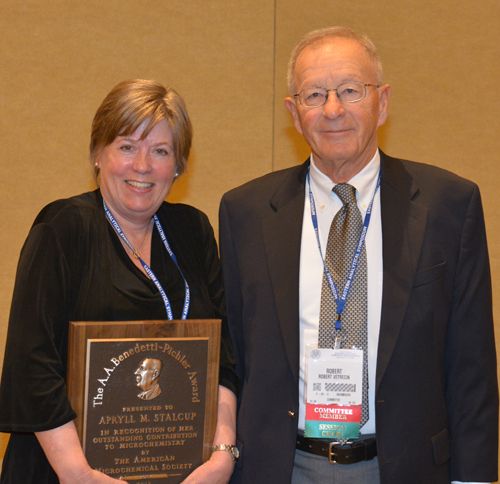Apryll Stalcup Wins Benedetti Pichler Award
The 2015 American Microchemical Society Benedetti Pichler Award has been presented to Apryll Stalcup, Director of the Irish Separation Science Cluster and Professor of Chemical Sciences at Dublin City University, Ireland.
The 2015 American Microchemical Society Benedetti Pichler Award has been presented to Apryll Stalcup, Director of the Irish Separation Science Cluster and Professor of Chemical Sciences at Dublin City University, Ireland. The award was presented at the Annual Symposium in November by the presenting organizations in recognition of her work in separation science.
Figure 1: Awardee Apryll Stallcup (left) with Robert Vetrecin (right)

Professor Stalcup is known for her work on understanding chromatographic and electrophoretic separation mechanisms, exploring new separation methods characterizing complex carbohydrates and nuclear forensics. Her group was the first to use sulphated-β-cyclodextrin, heparin, and quinine as chiral additives in capillary electrophoresis (CE). Innovative work in the application of surfaceâconfined ionic liquids (SCIL) in her group demonstrated the wide range of potential separation modes (reversed phase, normal phase, ion exchange, and ion exclusion) that can be obtained with these materials. More recently, her group has demonstrated that the linear solvation energy relationship model (LSER) can simultaneously account for the retention of neutrals as well as anions and cations on SCIL phases in liquid chromatography (LC). Professor Stalcup received a BS in chemistry from California State University-Sacramento in 1979. She obtained her PhD in chemistry in 1988 from Georgetown University in Washington, DC, where she worked under the direction of Daniel Martire. After a postdoctoral fellowship at the University of MissouriâRolla with Daniel Armstrong, she joined the University of HawaiiâManoa in 1990. In 1996, she moved to the University of Cincinnati and was promoted to Full Professor in 2001. In 2012, she relocated to Dublin City University. Stalcup is the author of over 100 publications, reviews, book chapters, and one patent. She has served as the thesis or dissertation advisor to 32 graduate students and postdoctoral fellows. She is a Fellow of the Institute of Chemistry of Ireland, a member of the American Chemical Society, the American Association of the Advancement of Science, Sigma Xi, the University of Cincinnati Graduate Fellows, and a Charter member of the University of Cincinnati Chapter’ National Academy of Inventors. In 2011, she was awarded the Cincinnati Chemist of the Year by the Cincinnati Section of the American Chemical Society. In the past she has served on the Greater Cincinnati Water Works Water Quality Advisory Board and currently serves on the Editorial Board of Trends in Analytical Chemistry and Journal of Liquid Chromatography and Related Techniques. She is the Co-Chair (with Prof. Jeremy Glennon, University College Cork) of the 31st International Symposium on Chromatography (ISC) to be held in Cork, Ireland, in 2016.
HPLC 2025 Preview: Fundamentally Speaking (Part 1)
May 13th 2025Michael Lämmerhofer from the Institute of Pharmaceutical Sciences, University of Tübingen, Germany, spoke to JFK Huber Lecture Award winner of 2024 Torgny Fornstedt, professor in analytical chemistry and leader of the Fundamental Separation Science Group, Karlstad University, Sweden, about his pioneering work in high performance liquid chromatography (HPLC) with a focus on fundamentals and industrial applications.
Biopharmaceutical Characterization in the Age of Artificial Intelligence
May 13th 2025AI-powered tools are enhancing precision, efficiency, and decision-making in biopharmaceutical development. Recently, Jared Auclair and Anurag Rathore explored AI's evolving role in biopharmaceuticals in detail.

.png&w=3840&q=75)

.png&w=3840&q=75)



.png&w=3840&q=75)



.png&w=3840&q=75)




